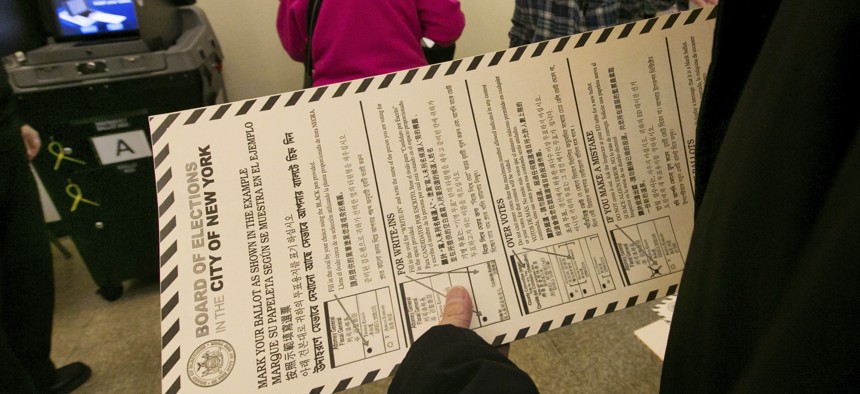Another Major City Adopts Ranked Choice Voting for Elections

In this file photo, a voter carries her ballot to be scanned at a polling place in New York's Chinatown neighborhood. A ballot measure will give New York City residents a chance to institute ranked choice voting in primaries and special elections. AP Photo/Richard Drew
New York will become the largest city in the country with ranked choice voting in some local elections after voters this week approved a ballot measure to adopt the system.
New York became the largest city in the nation to approve ranked choice voting in some local elections, with voters on Tuesday overwhelmingly approving a ballot measure to establish the system.
The new system, which will be used in primaries and special elections beginning in 2021, will allow voters to rank their preference for up to five candidates instead of selecting just one.
At least 11 cities use ranked choice voting, with Las Cruces, New Mexico and Eastpointe, Michigan among the cities that did so for the first time on election day this year, according to FairVote, an organization that backs such efforts. Maine is poised to become the first state to use ranked choice voting in general presidential elections after a law expanding the use of the voting method in the state takes effect in January.
Ranked choice voting systems work by allowing voters to rank their preference of candidates. If no candidate gets more than 50% of the vote, the candidate in last place is eliminated. Then the second-place choices of voters who had selected the last-place candidate are reallocated. This process is continued until one candidate receives more than 50% of the vote.
The system that New Yorkers approved Tuesday will allow voters to rank up to five candidates in primary and special elections for mayor, public advocate, comptroller, borough president and city council member. Voters will not be required to rank candidates, but can choose to do so. If no candidate has more than 50% of the vote, the system will create an instant runoff in which the lowest ranked candidate is eliminated and their second-choice votes are allotted to the other candidates until one emerges with a majority of support.
Ranked choice voting does not appear to favor one political party over another, rather it comes down to the circumstances around local elections, said Martin Gilens, a professor of public policy at the University of California in Los Angeles.
“It depends on the constellation of voters especially when there are multiple candidate and multiple parties involved,” he said.
Supporters of ranked choice voting say it can encourage greater voter participation because it allows people to vote for their preferred candidate without worrying about throwing their vote away on a third-party “spoiler” in races dominated by major party candidates.
“New York City voters showed confidence in growing evidence that ranked choice voting can strengthen local democracy, eliminate the spoiler effect in large fields of candidates, and allow fresh energy to enter races while making sure that candidates who win do so with majority support from the community,” said Rob Richie, president and CEO of FairVote.
Another benefit of ranked choice voting, said Gilens, is the system can decrease partisan polarization because candidates must try to appeal to a wider audience.
“It’s forcing them to be more moderate and to appeal to a broader constituency,” he said.
Opponents say the system can actually take power away from voters who choose not to complete rankings and may ultimately result in election of a candidate who has marginal community support.
“Not only is ranked choice voting too complicated, it disenfranchises voters, because ballots that do not include the two ultimate finalists are cast aside to manufacture a faux majority for the winner,” wrote Hans von Spakovsky and J. Adams in a Heritage Foundation report on ranked choice voting.
Cities that relied on ranked choice voting saw their systems put to the test in different ways this year. In Las Cruces, the city’s mayor was reelected after nine rounds of tallying ranked choice votes produced a majority winner.
In Eastpointe, the only city in Michigan to use ranked choice voting, a former mayor was elected to the city council after one runoff and another new council member was elected with a clear majority in the first round, the Macomb Daily reported. The city adopted the system to settle a lawsuit in which the Justice Department accused the city of diluting the voting power of black residents in citywide races.
While implementing ranked choice voting systems come with a cost, and may require education campaigns for voters, some analysis suggests that cities can save money in the long run by avoiding costly election runoffs.
A report by Citizen Union, a government watchdog group that has supported ranked choice voting, notes that Berkeley, California spends $190,000 per election to pay for ranked choice voting. But in 2016, the city’s system saved it an estimated $759,000 in costs associated with a mayoral and city council seat runoff election.
Andrea Noble is a staff correspondent with Route Fifty.
NEXT STORY: Kansas City Votes to Remove Martin Luther King Jr’s Name from Historic Street





